大学英语语法(英语专业必看)
英专生大一语法知识点
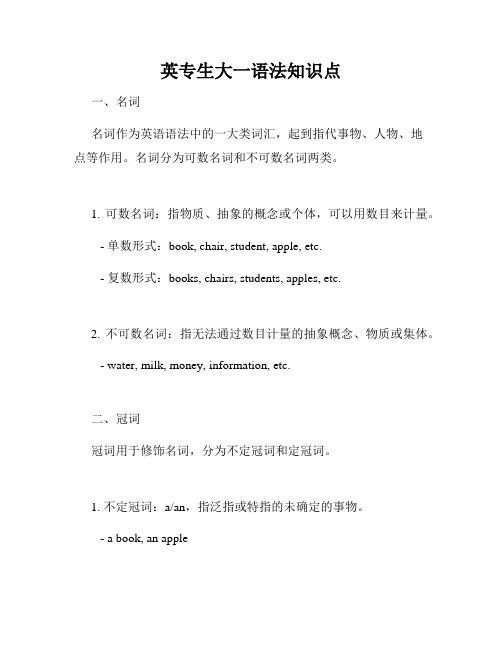
英专生大一语法知识点一、名词名词作为英语语法中的一大类词汇,起到指代事物、人物、地点等作用。
名词分为可数名词和不可数名词两类。
1. 可数名词:指物质、抽象的概念或个体,可以用数目来计量。
- 单数形式:book, chair, student, apple, etc.- 复数形式:books, chairs, students, apples, etc.2. 不可数名词:指无法通过数目计量的抽象概念、物质或集体。
- water, milk, money, information, etc.二、冠词冠词用于修饰名词,分为不定冠词和定冠词。
1. 不定冠词:a/an,指泛指或特指的未确定的事物。
- a book, an apple2. 定冠词:the,指特指的或已知的事物。
- the book, the apple三、代词代词作为名词的替代词,用于替代特定的人或事物。
1. 人称代词:- 主格:I, you, he, she, it, we, they- 宾格:me, you, him, her, it, us, them2. 物主代词:- 形容词性物主代词:my, your, his, her, its, our, their- 名词性物主代词:mine, yours, his, hers, its, ours, theirs3. 反身代词:用于强调动作的承受者是动作的执行者本身。
- myself, yourself, himself, herself, itself, ourselves, yourselves, themselves四、动词动词用于描述动作、状态或发生的事件。
1. 动词时态:- 一般现在时:表示经常性、习惯性的动作。
I study English.- 现在进行时:表示正在进行的动作。
She is reading a book.- 一般过去时:表示过去某个时间发生的动作。
They played basketball yesterday.- 过去进行时:表示过去某个时间正在进行的动作。
大学英语语法总结(全面)

大学英语语法总结(全面)大学英语语法总结(全面完整版)1. 介词(Prepositions)- 表示地点:at, in, on- 表示时间:at, in, on- 表示方式:by, with- 表示原因:because of, due to- 表示目的:for, to2. 冠词(Articles)- 定冠词:the- 不定冠词:a, an3. 代词(Pronouns)- 主格代词:I, you, he, she, it, we, they- 宾格代词:me, you, him, her, it, us, them- 所有格代词:my, your, his, her, its, our, their- 反身代词:myself, yourself, himself, herself, itself, ourselves, themselves4. 名词(Nouns)- 单数名词:book, chair, dog- 复数名词:books, chairs, dogs- 不可数名词:water, money, information5. 动词(Verbs)- 一般现在时:I walk, you walk, he/she/it walks, we walk, they walk- 一般过去时:I walked, you walked, he/she/it walked, we walked, they walked- 现在进行时:I am walking, you are walking, he/she/it is walking, we are walking, they are walking- 过去进行时:I was walking, you were walking, he/she/it was walking, we were walking, they were walking- 一般将来时:I will walk, you will walk, he/she/it will walk, we will walk, they will walk6. 形容词(Adjectives)- 描述名词特征:big, small, tall- 比较级:bigger, smaller, taller- 最高级:biggest, smallest, tallest7. 副词(Adverbs)- 表示方式:quickly, slowly- 表示程度:very, extremely- 表示时间:now, yesterday8. 连词(Conjunctions)- 表并列:and, or- 表递进:furthermore, moreover- 表转折:however, but- 表原因:because, since以上是大学英语语法的简要总结,希望对你有帮助。
大学英语语法知识点总结
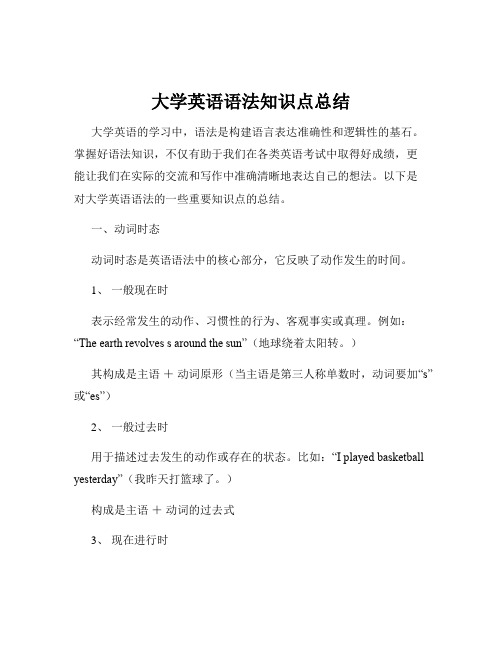
大学英语语法知识点总结大学英语的学习中,语法是构建语言表达准确性和逻辑性的基石。
掌握好语法知识,不仅有助于我们在各类英语考试中取得好成绩,更能让我们在实际的交流和写作中准确清晰地表达自己的想法。
以下是对大学英语语法的一些重要知识点的总结。
一、动词时态动词时态是英语语法中的核心部分,它反映了动作发生的时间。
1、一般现在时表示经常发生的动作、习惯性的行为、客观事实或真理。
例如:“The earth revolves s around the sun”(地球绕着太阳转。
)其构成是主语+动词原形(当主语是第三人称单数时,动词要加“s”或“es”)2、一般过去时用于描述过去发生的动作或存在的状态。
比如:“I played basketball yesterday”(我昨天打篮球了。
)构成是主语+动词的过去式3、现在进行时表示正在进行的动作。
像:“He is reading a book now”(他正在读书。
)结构为:主语+ be 动词(am/is/are)+动词的现在分词4、过去进行时强调过去某个时刻正在进行的动作。
例如:“I was doing myho mework at 8 o'clock last night”(昨晚八点我正在做作业。
)其形式为:主语+ was/were +动词的现在分词5、现在完成时表示过去发生的动作对现在造成的影响或结果,或者过去的动作一直持续到现在。
例如:“I have finished my work”(我已经完成了工作。
)由“主语+ have/has +动词的过去分词”构成6、过去完成时表示过去某一时间或动作之前已经发生或完成的动作。
例如:“By the end of last year, I had learned 5000 words”(到去年年底,我已经学了5000 个单词。
)结构为:主语+ had +动词的过去分词7、一般将来时用以表达将来要发生的动作或存在的状态。
大学英语语法知识
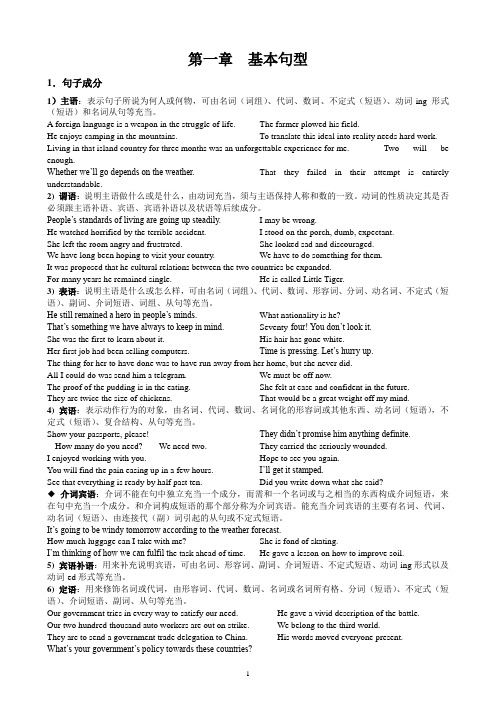
第一章基本句型1.句子成分1)主语:表示句子所说为何人或何物,可由名词(词组)、代词、数词、不定式(短语)、动词-ing 形式(短语)和名词从句等充当。
A foreign language is a weapon in the struggle of life. The farmer plowed his field.He enjoys camping in the mountains. To translate this ideal into reality needs hard work. Living in that island country for three months was an unforgettable experience for me. Two will be enough.Whether we’ll go depends on the weather.That they failed in their attempt is entirely understandable.2) 谓语:说明主语做什么或是什么,由动词充当,须与主语保持人称和数的一致。
动词的性质决定其是否必须跟主语补语、宾语、宾语补语以及状语等后续成分。
People’s standards of living are going up steadily.I may be wrong.He watched horrified by the terrible accident. I stood on the porch, dumb, expectant.She left the room angry and frustrated. She looked sad and discouraged.We have long been hoping to visit your country. We have to do something for them.It was proposed that he cultural relations between the two countries be expanded.For many years he remained single. He is called Little Tiger.3) 表语:说明主语是什么或怎么样,可由名词(词组)、代词、数词、形容词、分词、动名词、不定式(短语)、副词、介词短语、词组、从句等充当。
大学英语语法重点

As a student you ought to study hard. I think I should try to lose some weight. It is starry tonight; it ought to be a fine day tomorrow.
三、固定句型 (主句现在,从句过去;主句过去,从句过完)
1. It is about/ high time (that) + 过去 It is about time that we had dinner.
2. would rather +过去完成 I would rather he had not invited me.
控制得当就能成为很好的选手.
三、其它
1. should have done You should have arrived there earlier.
2. Should not have done He shouldn’t have presented the report to the mayor.
3. If only I had another chance. 要是我再有一次机会就好了。 4. I am so tired. If only I can take the day off tomorrow. 太疲倦了。如果
明天能不上班多好。 5. If only problems would come one at a time! 要是问题一次只发生一个
3. mean + ing,含义是“意味着”; mean + to do,含义是“打算、想要”。例如: Revolution means liberating the productive force . I didn't mean to hurt your feelings . Mean, remember, forget, regret, hate, prefer, go, stop, chance
英专大一语法知识点总结

英专大一语法知识点总结一、主语和谓语动词的一致性主语和谓语动词在人称和数上必须保持一致。
如果主语是第三人称单数,谓语动词要加上-s或-es。
例如:- She loves running in the park.(她喜欢在公园里跑步。
)- The dog barks loudly at night.(那只狗在晚上大声叫。
)二、时态的正确使用在英语中,时态有过去、现在和将来三种,每种时态的使用都有一定的规则。
以下是一些常用时态的用法:1. 一般现在时:表示常态、客观事实、经常性、习惯等情况。
例如:- I usually go to school by bus.(我通常坐公交车去学校。
)- Water boils at 100 degrees Celsius.(水在100摄氏度沸腾。
)2. 现在进行时:表示现在正在进行的动作或状态。
例如:- He is studying in the library.(他正在图书馆学习。
)- We are having dinner.(我们正在吃晚饭。
)3. 一般过去时:表示过去发生的动作或状态。
例如:- I visited my grandparents last weekend.(上个周末我去看望了我的祖父母。
)- She lived in London when she was young.(她年轻的时候住在伦敦。
)4. 过去进行时:表示过去正在进行的动作或状态。
例如:- They were playing basketball at 5 p.m. yesterday.(昨天下午5点他们在打篮球。
)- I was studying for the exam all night.(我整夜都在备考。
)5. 一般将来时:表示将来某个时间要发生的动作或状态。
例如:- We will have a party next week.(下周我们将举办派对。
)- She is going to travel around the world.(她打算环游世界。
大学英语语法大全-太经典了.
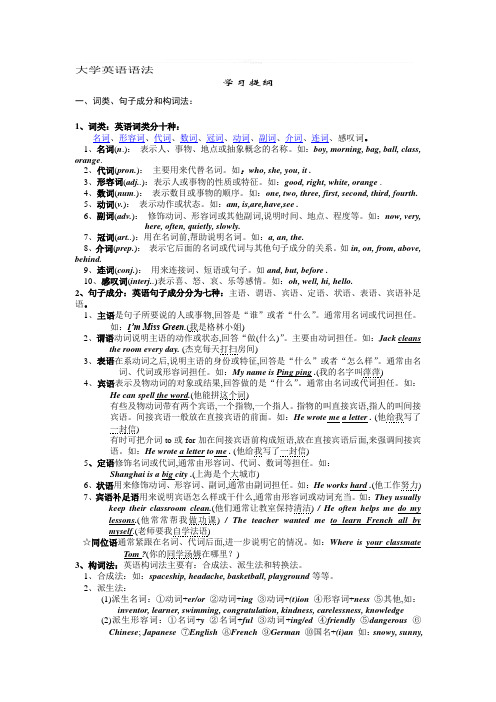
大学英语语法学习提纲一、词类、句子成分和构词法:1、词类:英语词类分十种:名词、形容词、代词、数词、冠词、动词、副词、介词、连词、感叹词。
1、名词(n.):表示人、事物、地点或抽象概念的名称。
如:boy, morning, bag, ball, class, orange.2、代词(pron.):主要用来代替名词。
如:who, she, you, it .3、形容词(adj..):表示人或事物的性质或特征。
如:good, right, white, orange .4、数词(num.):表示数目或事物的顺序。
如:one, two, three, first, second, third, fourth.5、动词(v.):表示动作或状态。
如:am, is,are,have,see .6、副词(adv.):修饰动词、形容词或其他副词,说明时间、地点、程度等。
如:now, very,here, often, quietly, slowly.7、冠词(art..):用在名词前,帮助说明名词。
如:a, an, the.8、介词(prep.):表示它后面的名词或代词与其他句子成分的关系。
如in, on, from, above, behind.9、连词(conj.):用来连接词、短语或句子。
如and, but, before .10、感叹词(interj..)表示喜、怒、哀、乐等感情。
如:oh, well, hi, hello.2、句子成分:英语句子成分分为七种:主语、谓语、宾语、定语、状语、表语、宾语补足语。
1、主语是句子所要说的人或事物,回答是“谁”或者“什么”。
通常用名词或代词担任。
如:I’m Miss Green.(我是格林小姐)2、谓语动词说明主语的动作或状态,回答“做(什么)”。
主要由动词担任。
如:Jack cleansthe room every day. (杰克每天打扫房间)3、表语在系动词之后,说明主语的身份或特征,回答是“什么”或者“怎么样”。
大学英语必会语法知识(精华打印版)
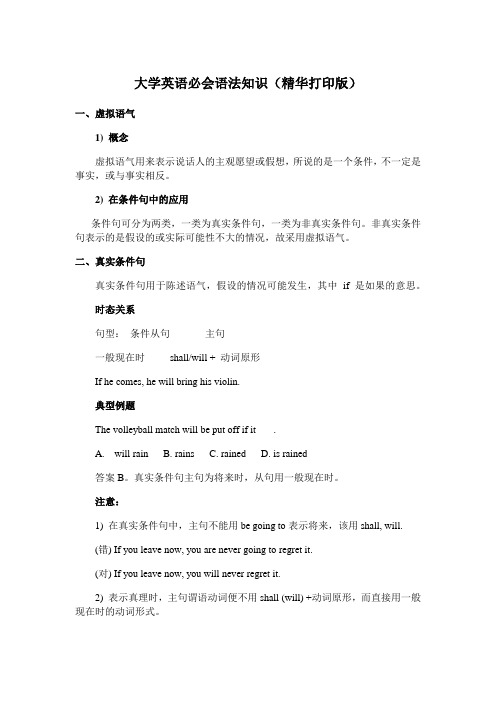
大学英语必会语法知识(精华打印版)一、虚拟语气1) 概念虚拟语气用来表示说话人的主观愿望或假想,所说的是一个条件,不一定是事实,或与事实相反。
2) 在条件句中的应用条件句可分为两类,一类为真实条件句,一类为非真实条件句。
非真实条件句表示的是假设的或实际可能性不大的情况,故采用虚拟语气。
二、真实条件句真实条件句用于陈述语气,假设的情况可能发生,其中if 是如果的意思。
时态关系句型:条件从句主句一般现在时shall/will + 动词原形If he comes, he will bring his violin.典型例题The volleyball match will be put off if it ___.A.will rainB. rainsC. rainedD. is rained答案B。
真实条件句主句为将来时,从句用一般现在时。
注意:1) 在真实条件句中,主句不能用be going to表示将来,该用shall, will.(错) If you leave now, you are never going to regret it.(对) If you leave now, you will never regret it.2) 表示真理时,主句谓语动词便不用shall (will) +动词原形,而直接用一般现在时的动词形式。
三、非真实条件句时态:可以表示过去,现在和将来的情况。
它的基本特点是时态退后。
a.同现在事实相反的假设。
句型:条件从句主句一般过去时should( would) +动词原形If they were here, they would help you.b.表示于过去事实相反的假设。
句型:条件从句主句过去完成时should(would) have+ 过去分词If she had worked harder, she would have succeeded.The rice would not have been burnt if you had been more careful.If my lawyer had been here last Saturday, he would have prevented me from going.If he had come yesterday, I should / would have told him about it.含义:He did not come yesterday, so I did not tell him about it.If he had not been ill and missed many classes, he would have made greater progress.含义:He was ill and missed many lessons, so he did not make greater progress.c.表示对将来的假想句型:条件从句主句一般过去时should+ 动词原形were+ 不定式would + 动词原形should+ 动词原形If you succeeded, everything would be all right.If you should succeed, everything would be all right.If you were to succeed, everything would be all right.四、虚拟条件句的倒装虚拟条件句的从句部分如果含有were, should, 或had, 可将if省略,再把were, should或had 移到从句句首,实行倒装。
- 1、下载文档前请自行甄别文档内容的完整性,平台不提供额外的编辑、内容补充、找答案等附加服务。
- 2、"仅部分预览"的文档,不可在线预览部分如存在完整性等问题,可反馈申请退款(可完整预览的文档不适用该条件!)。
- 3、如文档侵犯您的权益,请联系客服反馈,我们会尽快为您处理(人工客服工作时间:9:00-18:30)。
1.Noun
Identify the uncountable nouns
• 1. Nouns that have no distinct, separate parts, we look as the whole (气、液、固体) • 2. Nouns that have parts that are too small or insignificant to count (sand grass hair)
• 3. Nouns that are classes or categories of things (food, clothing, money) P49
• 4. Nouns that are abstraction (life, work, music)
• 5. Subjects of study (history, math)
不可数变可数三大规律
• 1. 物质名词(总称名词)若表示不同的种类,或者表示特定的意思,或者是液体名词表示“几杯”或“几瓶”这样的数量时。
• 2. 抽象名词若是具体化,则可数。
与此相反,可数转化为不可数。
• 3. 当一个名词表示抽象、总称的概念,则为不可数,当一个名词表示具体、特定的事物,则为可数。
物质名词/总称名词变可数
• 1. 总称名词具体化
•A: Would you like a cake?
•B: No. I don’t like cake.
• 2. 物质名词变意思
•I need some paper. / I bought a paper.
• 3. 液体物质名词表数量
•Two beers and three coffees, please.
抽象名词变可数
•Art (an art) / beauty (a beauty) / youth (a youth)
•Eg. 1. Youth is not a time of life. It is a state of mind.
• 2. When as a child I laughed and wept– time crept.
•When as a youth I dreamed and talked-time walked.
2Articles
Specific reference--the
• 1. 特指是针对交际双方来说的
• 2. 特指就是根据说话者和听话者共有的知识,或根据上下文,可以识别的事物。
• 3. 说话者用the是想要听话者找到双方心中都知道的所知,而听话者一方“断定”或“还原”所指对象的方法有多种。
• 1. Situational/cultural reference
•Eg. Albert Einstein, the famous physicist.
• 2. textual co-reference—
•anaphoric reference (前指)&
•cataphoric reference (后指
• 1. general knowledge (the sun, the moon, the North Pole, the Equator, the universe, the Renaissance, the Pope 罗马教皇)
• 2. specific knowledge/ local use (let’s go to the library)
• 3. immediate situation (The roses are very beautiful. Can you find the page?)
不定冠词泛指与非泛指
a/an +uncountable noun
• A washing powder I’ve found to be extremely good is “Tide”. (种类)
•I like a beer please. (一杯)
• A glass / an iron (意变)
Conditions when “one” is better
• 1. 强调数量“一”时用one (one only),
•C: when will they be ready? A: they take a week. C: One week, right, thanks.
• 2. 用于准确的对照数字
•Two kilos of flour and one litter of water.
• 3. 讲故事中用one, 强调人或事作为将要讲到的话题
•There is one place we go to which is a Mexican restaurant, and they had a happy
•hour between 5:30 and 7:30.
Conditions when “a/an” is better
• 1. 类指意义的”a/an”不能换”one”
• A shotgun is no good.
• 2. 表示度量的”a/an”不能换”one”
•The rent is $100 a week.
• 3. 表示数量的固定搭配”a/an”不能换”one”
• A few, a great many, a large number of
用不用冠词的意义区别
• 1. 家具生活类:at (the) table, in (the) bed
• 2. 处所、建筑物或社会机构:go to (the) prison, in/at (the)church, in (the) hospital • 3. 关于上学:class, school, college, university, desk
• 4. 关于sea: go to/ at/ by (the) sea
• 5. 抽象总称意义与具体特指意义: time, red, day, place, question, etc
使用冠词的场合
• 1. 形容词或副词的最高级、序数词以及only用作形容词加名词连用时,一般用the.
•The only/ best way to cope with the problem.
• 2. 乐器、乐团、合唱团及流行音乐团体前加the
•The Beatles/ Philadelphia Orchestra/ piano
• 3. the 与姓氏连用
•The Smiths, the Bushes
其他不用冠词的场合
• 1. 关于职业、身份或头衔
• 2. 关于球类、棋类运动(不加冠词)
• 3. 特殊名词(nature, society, history, man, space)
• 4. 关于星期
• 5. 关于四季
• 6. 关于昼夜各阶段(by, at, after, before)
•7. 关于进餐(有adj 则加the)
•8. 关于交通工具(by后不加,其他时候要加)
•9. 关于通讯工具(by后不加,其他时候要加)
•10. 平行结构
•关于职业、身份或头衔1. 独一无二头衔在表语位置
•John is (the) captain of the team
• 2.独一无二头衔在主语补足语位置
•He was elected President the second time.
• 3.独一无二头衔在宾语补足语位置
•We elected Henry chairman.
• 4.独一无二头衔在同位语位置
•Elizabeth II, Queen of England
特殊名词
•If you destroy nature you’ll suffer from it. (泛指自然界)
•Society turns people into criminals. (社会)
•Man has taken his first step into space. (泛指星球之间的空间) •Man can conquer nature, (泛指人类)
•History may repeat it self. (泛指人类整个历史)。
